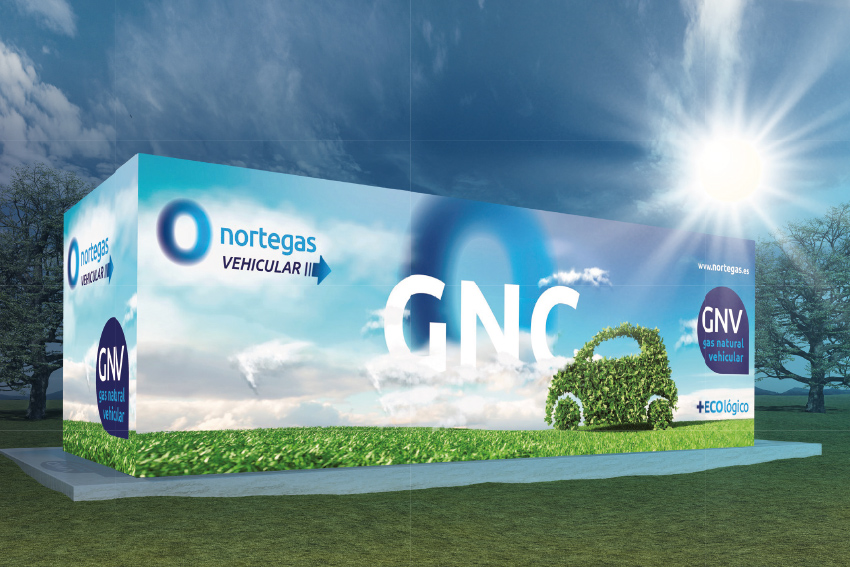
28
Jul
2020
Repsol and Nortegas agree the opening of a network of natural gas for vehicle supply points
• The strategic partnership between Repsol and Nortegas will provide the general public with a network of natural gas for vehicle supply points at the Repsol Group service stations, first and foremost in the Basque Country, Cantabria and Asturias.
• The first natural gas filling station under this agreement, construction work on which started this week, will be at a Repsol service station in Sestao (Bizkaia).
• A further two locations have already been chosen and where pre-building work is on the point of getting underway. One in Madrid and another in Gipuzkoa.
• Both companies are thus consolidating their commitment to natural gas for vehicles as part of their strategy to foster the use of alternative energies.
• The companies will invest nearly €400,000 in the first supply point, with the support of the Basque Energy Board (EVE) though its efficient mobility grant programme.
Bilbao, 28 July 2020.- Repsol and Nortegas Green Energy Solutions have signed an agreement to give momentum to the installation of a network of natural gas for vehicle (NGV) supply points at the Repsol Group service stations.
Thanks to this partnership, both companies are committed to providing the public with a network of natural gas supply points, at the Repsol Group service stations, first and foremost in the regions where Nortegas operates as a natural gas distributor, i.e., in the Basque Country, Cantabria and Asturias.
Nortegas expressed its “great satisfaction” with the agreement reached with Repsol, “a company with which we share our firm commitment to finding environmentally-friendly and efficient energy solutions, that are part of a sustainable energy mix”. In fact, “natural gas for vehicles is an ally in the decarbonisation process: it offers a clean alternative that is environmentally and economically efficient”.
In turn, Repsol stressed that this agreement with Nortegas “will help us to continue to position NGV as a mobility alternative. Furthermore, Repsol is consolidating its position as a multi-energy company, a leader in mobility and committed to achieving zero net emissions by 2050, where it is the first company of its sector to adopt this ambitious target”.
Repsol currently already has five NGV supply points along the main Spanish routes (Seseña and Guarromán, on the A4; Mojo Gallardo, on the A-381; Fontioso, on the A1; and Hostalets, on the AP7). It will shortly be opening a further three points in Mérida (Badajoz), Albatera (Alicante) and Hernani (Gipuzkoa).
Nortegas is also working on developing and implementing several biomethane production projects. The gas is obtained by upgrading the biogas generated in landfills or wastewater treatment plants. It can then be sold as natural gas for vehicles, thus adding greater value to this joint initiative.
First natural gas filling station in Bizkaia with NGV continuous supply
The first of the Repsol and Nortegas natural gas filling stations to be opened will be in Sestao (Bizkaia), specifically at the Repsol service station at Kilometre 9.2 on the Barakaldo to Valle de Trápaga road, very close to the A-8 junction.
The companies will invest nearly €400,000 in the first compressed natural gas (CNG) supply point, with the support of the Basque Energy Board (EVE) though its efficient mobility grant programme.
Construction is underway and the station will be able to serve light vehicles (cars and vans), as well as urban medium and heavy vehicles (delivery vans and trucks).
It will the first station in the province of Bizkaia to have a continuous supply of NGV, without needing a tank, thanks to Nortegas’s extensive infrastructure. Nortegas is thus bringing this alternative fuel to one of the provinces in its traditional area of influence.
In addition, Repsol and Nortegas have already a further two locations where pre-building work is on the point of getting underway, one in Madrid and another in Gipuzkoa
Natural Gas for Vehicles, another mobility alternative
NGV is an alternative fuel that is very well-suited for transport, particularly freight. There are two types of natural gas of vehicles according to its thermal phase, compressed natural gas (CNG) and liquefied natural gas (LNG). CNG is natural gas stored at high pressures, used in light vehicles and some heavy vehicles, such as buses, utility trucks and for short- and medium-distance transports. LNG is natural gas in its liquefied state and undergoes a cryogenic process at -161ºC that is used in heavy transport, as it provides a greater range.
As regards the environment, natural gas improves air quality in cities: it reduces nitrogen oxides (NOx) emissions in 85%, eliminates 96% of the particulate matter (PM) emissions and helps to achieve CO2 emission targets, as it cuts them by up to 25%. In Spain, those vehicles therefore hold the ECO label, awarded by the General Traffic Directorate (DGT), which exempts them from the circulation restrictions in cities.
The natural gas engine has similar mechanicals to the petrol one. In some cases, the vehicle’s engine can be modified so that it can use natural gas instead of the traditional fuel. It can therefore be awarded the ECO label and the user can thus access the different benefits and advantages that increasingly more regions and municipalities are beginning to apply, such as access to the controlled emission areas, discounts on taxes and car parks, etc.

